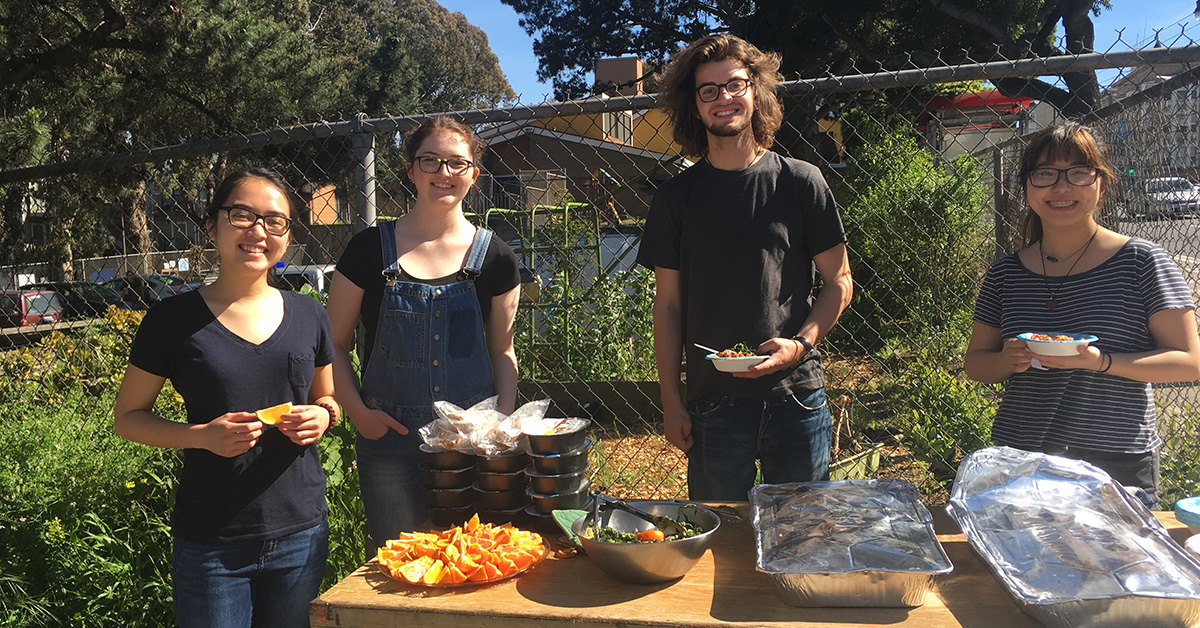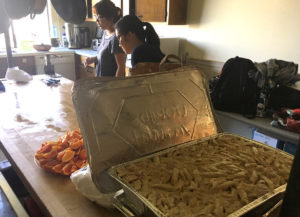University of San Francisco’s Food Recovery Network Chapter Feeds Community Four Times a Week
- by Maggie Kraft

Student volunteers from the University of San Francisco’s Food Recovery Network chapter preparing to serve their community meal
San Franciscans walking by the corner of Divisadero and Turk Streets on a Friday evening often look up in surprise from their phones at the smells of delicious food, then smile at the University of San Francisco students serving a free community meal.
I smiled, too, when I met with USF’s energetic Food Recovery Network chapter founder, Ayrris Tate, and a few members of the team at New Liberation Church before the weekly event there. A national organization with which Bon Appétit has long partnered, Food Recovery Network brings students on college campuses together to fight food waste and hunger by recovering excess edible food on their campus and donating it to people in need. The USF students take that commitment to fight food waste one step further — recovering food and preparing and serving it at pop-up community dinners several days a week.
In the New Liberation Church kitchen, five student volunteers were reheating salmon pasta from Bon Appétit’s Market Café, chopping oranges, and stir-frying greens recovered from a local farmers’ market. They worked neatly and efficiently, checking in with each other to double-check timing and set up. Nearly all of the volunteers were underclassmen who’ve been involved with the organization for one or two years. They have different reasons for participating, from wanting to help provide hot meals to those in need to reducing carbon emissions caused by food waste.
Volunteers work one or more FRN shifts each week. Responsibilities include recovering food from the farmers’ market, or picking up from Executive Chef Joe De Bono’s team at the Market Café, or preparing and serving the food at one of their four weekly community dinners in the neighborhoods around University of San Francisco. Ayrris explained that each of the community dinners are unique in their setting and attendees. They have chosen locations based on the location of their community partners and the connections they’ve made over the past three years. One dinner takes place after a community church service for the attendees, while others (like the one I attended) are standalone events. The goal of each dinner is to engage with the community and foster a positive learning experience for both the students and community members.
This school year alone, the USF FRN chapter has recovered more than 8,300 pounds of perishable food!
At each event, students share information and statistics about food waste, including the fact that 40% of food produced in the US each year goes uneaten — the equivalent of $165 billion, according to the Natural Resources Defense Council. The FRN chapter at USF is fighting valiantly to bring that number down: This school year alone, they have recovered more than 8,300 pounds of perishable food!
Though she is graduating, Ayrris remains confident that the chapter she founded will remain robust. She pointed out co-chair Maggie Shugerman, explaining that Maggie, a sophomore at USF, has become an incredible leader for the FRN group, expanding the program, recruiting new members, and working hard to keep everything running smoothly. Proving her point, Maggie was rushing around to handle some last-minute logistical troubles before the dinner began.
Though the students recover the food and organize the dinners themselves, the Bon Appétit chefs and managers offer support by providing donations of excess food and a place to store it safely. Those donations ensure that any excess food generated at USF is feeding people, not landfills — meeting Bon Appétit’s food waste commitments and allowing FRN students to expand their reach, serving dinners at locations where they don’t have the ability to prepare dinner from scratch.
By the time I left, the FRN volunteers were gathered in the sunshine, ready to serve the carefully prepared produce and pasta in front of the church’s community garden. I look forward to seeing how these USF students’ commitment to their community continues to grow and develop, and am glad for their partnership with Bon Appétit, which helps us fight food waste on campus and helps lessen food insecurity within the surrounding neighborhoods.
